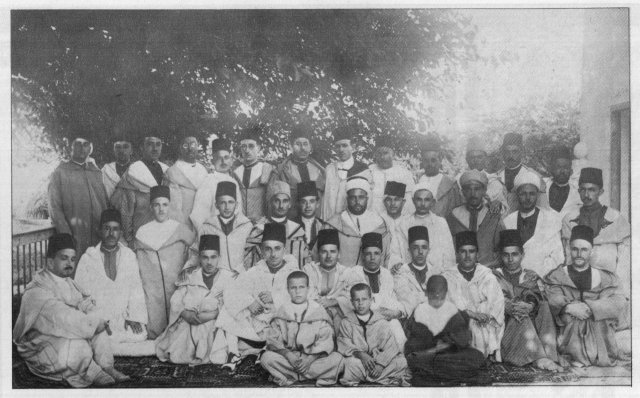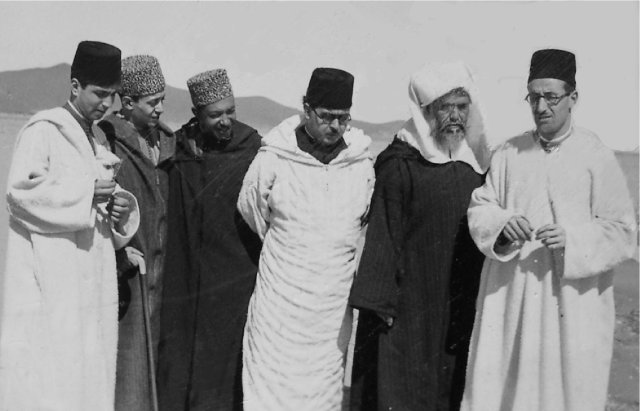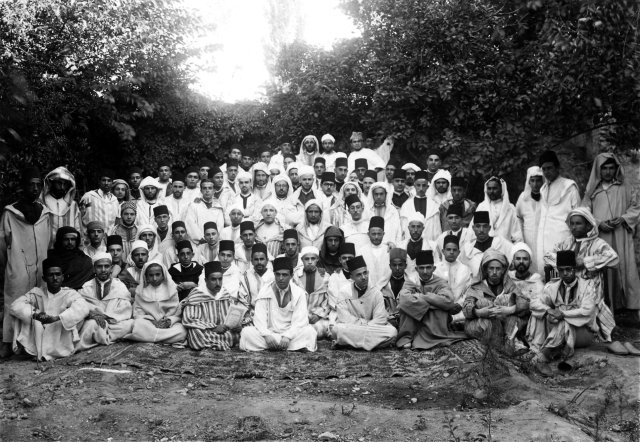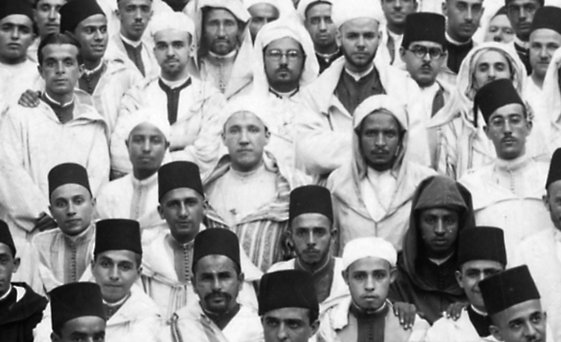Pages of the history of the Moroccan National Movement - Said Hajji: his life and his political and cultural heritage, by Abou Bakr Kadiri
Extract of the foreword of vol. 1, ed. 1979
Any biographical research tending to recall the history of the contemporary rebirth of Morocco requires to cast even a furtive glance at the general situation in which was our country for more than fifty years when it still was under the yoke of colonialism, and was prevented to have access to the free air and to aspire to a better future. Shortly after the establishment of the regime of the Protectorate, Morocco saw the emergence of a patriotic movement led by a group of pioneers whose merit was to provide the foundations of the contemporary period of the political and cultural rebirth. The knoweledge of this period helps to appreciate to its right value the engagement of those patriots who distinguished themselves in the very beginning of the National Movement, and to realize the immensity of the efforts they put as well on the promotion of a real cultural revival as on the struggle they led to safeguard the values of their country and to protect the Moroccan nation against the policy of integration and assimilation adopted by the colonial power against the community of our people.
Thus, a radical change took place in the mentalities. The Moroccans in general, and the intellectual class in particular, became aware of their responsabilities with respect to their country. They are conscious of what they must undertake to safeguard and defend their rights on one hand, and to contribute to the process of its progress and its evolution on the other hand.
The circumstances that Morocco had to endure since the foreign occupation were the darkest ones of its history. The large majority of the Moroccans had a deep feeling of humiliation and discouragement. They lost confidence in themselves and ended up not believing any more in their delivery, so much they were under a traumatic state which they never knew before throughout their long history. The Moroccans were aware that they have lost the most precious gift of heaven, namely their freedom and their independance. But, what made their situation more grave than expected was the fact that they saw in the occupying forces an implacable enemy having at its disposal military means which were missing in the conquered country, and having recourse to all kinds of cunning stratagems and shemes in front of which they felt completely disabelt. If our fighters did not resist the enemy in the Rif and the Atlas mountains, one would have said that the torch which has always burnt in the Moroccan heart and was supposed never to capitulate to any foreign conqueror, in spite of his military superiority and the tricks he may use, is about to be extinguished, and that its flame has almost reached vanishing point without leaving behind it any trace of its burning, as it would belong from now on to the legend of the centuries.
In these exceptional circumstances, whereas our country was living in an overpowerimg darkness, a small group of young people emerged to face the colonial power, and put itself in the top rank of the political scene to indicate to the people the right road to follow, explaining the dangers which it was likely to run if it did not pay attention to the plots hatched by the enemy, and recommending to their fellow citizens to act with prudence, to be constantly vigilant and to keep always in mind the objective towards which they must concentrate all their efforts, namely the reconquest of their freedom and the delivery of the foreign influence. The number of the pioneers who belonged to the first group of the young patriots hardly exceeded the fingers of the hand in Salé, Rabat, Fès, Tetouan and some other cities across Morocco. These small groups which consituted the kernel of the Moroccan patriotism acted at the beginning independantly from each other, but shared the same values and had the same objective: the common will of raising the prestige of their country.
Later, when the contacts were established between these various groupings, those noted that they were united for a common purpose and totally convinced of showing solidarity with one another. They were aware that this solidarity will put their courage and skill to the test and were entirely conscious that their struggle for liberty was complying with the course of history. These first groupings of those young patriots provided the foundations of the rebirth of which we collect the fruits today. The opinions that they emitted, the principles which they defended, the articles and the speeches which they conceived and diffused are as many sources of light which clarified to the Moroccan people the way it choose to follow after dissipating the clouds of dust which veiled their spirits and struck them with stupor and consternation. They devoted themselves fully to the patriotic cause, drew from its sources the essence of their energy, explained its principles and objectives and were mobilised around the same ideal. The full advantage that the Moroccans gained of this first phase which led to the creation of the National Movement and made the people enjoy the fruit of the struggle led by these pioneers even after the proclamation of the independance. is due to the active role played by the leading team of the young generation who believed in God, their fatherland and the values it represented in their eyes.
The freedom which the Moroccan people enjoy today could be restored only thanks to the constant work achieved by these patriots of the first hour who traced the road of the fight against oppression, largely contributed to wash the affront caused to their country and deserved the merit of claiming its legitimate rights in a moment the natives of this country were exposed to all kinds of repression. They sacrificed themselves for the honor of the fatherland and wrote by so doing a prestigious page of the contemporary history of Morocco. They were the pillars of the avant garde movement without complaining about what they had to endure, without revealing any weakness nor letting themselves cut down. On the contrary, they were full with enthusiasm, explained the reasons of their struggle, claimed forcefully the despoiled rights and woke up the national conscience. Their struggle was not limited to only one field nor oriented to achieve a particular goal excluding other objectives of national interest. It kept in touch with sectors of different areas of activity, as well on the political and cultural level as on the social and economic field. This group of those young patriots was conscious that the desired evolution could never be achieved if it did not embrace the different aspects of the life of the nation. It acted thus in the educational field and worked in the interest of the intellectual youth. It spared no effort to defend the interests of the working class, the peasants, the small shopkeepers and the manual craftsmen. It made the Moroccan cause well known abroad and succeeded, thanks to the faith which animated its members to realize their aspiration to recover their dignity and their liberty.
Extract of the foreword of volume 2, edition 1982
Said succeeded in constituting around him a group of friends and comrades and benefited from his permanent contact with them to develop his personality and discipline his readings during the first phase of his cultural life. He exchanged with them ideas, raised theoretical statements, initiated themes of discussion and argued against the points of view which he did not share. That was how his spirit matured, his mental faculties developed, and he started to count on himself in all what he undertook or had the ambition to undertake. He was always disposed to cooperate with the friends of his entourage in any subject requiring a joint work and calling upon the spirit of solidarity to conclude a collective action. Said was not an individualist in the narrowest sense of the word. He never wanted to be the single initiator of all activities, nor had he the community spirit by weakness, nor was he unable to undertake any matter outside the framework of a collective brain storming. He joined together two qualities: he acted on a purely individual basis when he estimated that his duty called upon him to achieve a national or cultural work. In this case, he relied only on himself, thought on the means likely to facilitate the achievement of what he intended to realize, without sparing either his efforts or his intellectual abilities and methodic style until he reached the principle objectives he intended to achieve. When he decided to create his daily newspaper "Almaghrib", he relied only on himself, from the very beginning to the end of the project. He did not need any assistance in searching the printing works, the linotypists, an adequate administrative seat and a dynamic team of experienced journalists. The only person who assisted him was his father who placed a suitable location for the printing works at his disposal and contributed by taking in charge the expenses of first installation, which encouraged him to start immediately the printing of his newspaper leaving for an ulterior date the constitution of the printing company which will require the participation of the members of his family and some of his acquaintances. His friends helped him a great deal with their editorial contributions during the phase of launching the newspaper. Then, little by little, he constituted around him a team of writers that he succeeded to recruit among the elite of the intellectual youth of that time.
Said used to take his responsibilities on a purely personal basis in all his activities, but when the circumstances required to participate in the realization of a common work with others or that the political organisation to which he belonged called upon him to achieve a task of national interest, he was of an availiability of every moment. One can say that he was always disposed to be subject to the influence of the group of his entourage although he exerted in his turn on this group an undeniable ascending. His plans emanated most of the time from an individual initiative, even if they were sometimes the fruit of a collective reflexion, especially when they intended to require from the leadership of the National Party the statement or the readaptation of some positions according to the interfierence of new elements in the political process. Those who followed closely the stages he traversed in his life as a militant, as well in the field of the national activities as of the cultural ones, know at which point he was sure of himself in all the panoply of projects he planned to realize, but he was conscious that some of these projects, by their nature, required an external assistance to be crowned with success, and he was obliged to seek around him collaborators to contribute to their concretization.
Said had the gift of choosing his collaborators in accordance with the projects he planned. When he made the acquisition of the printing press for his newspaper "Almaghrib", he installed it initially in a modest place located in Salé and equipped with a decayed material. He created a company which went into partnership with some external partners, and was then be able to acquire the printing works "Al Oumnia" in the center of Rabat. It was in his intentions, if he had lived longer, to make of his project a real atelier for planning, directing and publishing old Moroccan books in order to promote the national culture and not only to publish his daily newspaper "Almaghrib." He had in mind as a future possibility to publish a monthly magazine, in the artform of the publication of "Dar Al Hilal" in Egypt to contribute to the revival of the Moroccan cultural heritage by printing the most invaluable manuscripts preserved in the public libraries or are in private properties to make them accessible to the public.
Moreover, when he decided to publish in 1937 the cultural and literary supplement of "Almaghrib", he choose the most eminent writers in the editorial board. He provoked around him an immense feeling of admiration by grouping together in the same team worthy men such as the jurisconsult Abou Bakr Zniber and the famous historian Mohammed ben Ali Doukkali, and young intellectuals like Mohammed El Fassi, Ahmed Bennani, Abdallah Ibrahim, Abderrahman El Fassi, Kacem Zhiri, and many others. The average age was, with regard to the representatives of the oldest generation around 60 years and more, and as regards the young intellectuals around 20 years. In spite of this great difference in age between all and sundry, Said succeeded in gathering them in a homogeneous team to which we owe a great deal of writings at a time when the inspirations belonged to the driven back tendencies and freedoms were completely non existent. All the members of this team, in spite of the difference in age, formation and talents, saw in Said a genuine pivot, listened to his suggestions with the maximum of attention and considered his articles as models of orientation submitted to their reflexion. It is enough instructive to read all what the members of this cultural family wrote on Said after his passing if we want to appreciate to its just value the place he occupied within the circle of his collaborators as well as the consideration that all carried to him.
As far as his national and political activities were concerned, it is unanimously recognized that he played a role of foreground in spite of his young age. He has largely contributed to the activities of the National Movement, not only at the level of Salé but at the national level. When he came back from the Middle East, he was asked to take part to a restricted team to conceive and elaborate the book of "the claims of the Moroccan People" which was destined to be presented to the Government of the Protectorate. Said counted among the pricipal actors of the National Action Committee and later of the National Party. He was in permanent contact with the main leaders of the Party, and had a strong affinity for Ahmed Elyazidi, Omar ben Abdeljalil, Mohammed Elfassi, Ahmed Balafrej and Hachmi Filali. The private activities of Said and his own projects never prevented him from taking part in collective tasks of political interest, as a member of a national group and a weldpart of an interdependant whole.

Célebration de la libération des détenus en 1932. Assis de d. à g.: A.Maâninou, Saïd Hajji, B. Kadiri 4, Mohammed Hajji 7, Abderrahman Hajji 10. au milieu: M. Chemao 2, A. Sbihi 3, A. El Fassi 4, Abdelkrim Hajji 7, Dernier rang: M. Elyazidi 8.

A g. Saïd Hajji, au c. Hassan Alwazzani, à d. Mohammed Elyazidi - 1936.

Rassemblement patriotique

Extrait de la photo ci-dessus:En haut de g. à d.: B. Kadiri 4. Au milieu à g.: Abdelkrim Hajji. Au centre: M. El Fassi. A d.: M. Chemao, M. Hassan Elwazzani, Omar b. Abdeljalil. En bas, à g.: Saïd Hajji




